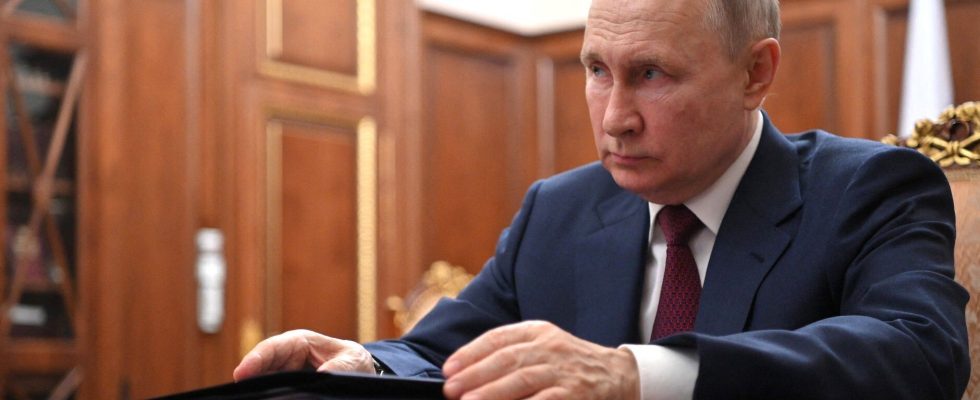“This disorder is beneficial for Russia, because the globalist toad will be distracted from Ukraine and busy trying to put out the eternal fire in the Middle East,” responded Sergei Mardan, one of the propagandist hosts, on his Telegram channel. most famous Russians, the day after the Hamas attack on Israel on October 7. He adds: “Iran is our true military ally. Israel is an ally of the United States. So it is easy to choose sides!”
Since Hamas’ surprise attack on Israel and its unbearable images, Russia’s star hosts, all pro-Kremlin, have cynically celebrated the resumption of fighting between Israel and Hamas as “a distraction to distract the West from Ukraine.” Valery Soloviev, Putin’s favorite propagandist, on the day of the attack similarly placed all the blame on America as a “guarantor of peace in the region.” It was four days later, this Tuesday, October 10, that Vladimir Putin finally spoke, and declared that the conflict between Israel and Palestinian Hamas demonstrated the “failure” of United States policy in the Middle East. .
Apart from several Russian neo-Nazi militias, like Roussitch, or certain Telegram channels affiliated with Wagner, who rejoice in the massacres perpetrated on Israelis, certain “trolls” compare Hamas terrorists to the savagery of the Ukrainian army in Donbass. The Russian newspaper Moskovsky Kosmolets claims that Ukraine transferred “American weapons” to the Gaza terrorist organization. “Fake news” that Ukrainian intelligence services immediately denounce, warning of a possible delivery of Western weapons by Russia to the Palestinian terrorist group. One more opportunity for the Kremlin to discredit kyiv, raise it Kyiv Independent.
“The Kremlin is already exploiting and will likely continue to exploit Hamas attacks in Israel to advance several information operations intended to reduce US and Western support and attention to Ukraine,” the think tank interprets. American tank Institute of Studies of War.
“Talk to all the actors”
Diplomatically, Russia opted for more restrained statements, calling for de-escalation on both sides. At the UN Security Council, Moscow condemned the attack and called for “stopping the bloodshed”, without ever naming Hamas. Because Moscow is keen to maintain its relations with both parties to the conflict, unlike Western countries which position themselves in favor of Israel. “In the Israeli-Palestinian conflict, Russia’s overall position is neutrality, that is to say talking with all the actors,” summarizes Milàn Czerny, analyst of Russia and the Middle East.
On Monday, the secretary of the Arab League, Ahmed Aboul Gheit went to the Moscow capital, where he was received by Sergei Lavrov. The Russian Minister of Foreign Affairs reiterated his desire for a two-state solution, before meeting on October 10 with Sameh Shoukry, Egyptian Minister of Foreign Affairs.
It must be said that between 2015 and 2020, Russia was a platform for discussion and structuring of Palestinian movements, including Hamas. A posture inherited from the Soviet tradition of support for Palestine against Israel. Senior Hamas officials visited Russia in May and September 2022, while in March 2023 the Palestinian terrorist organization sent a high-ranking delegation to Russia to meet with Sergei Lavrov, warning the Kremlin that “patience” of the group towards Israel was “at the end”.
Could Russia have gone so far as to get directly involved in the Hamas attack? Certainly, information provided via Iran or a transfer of military equipment from Moscow have been mentioned by several experts, relying on Russia’s official support for Tehran, suspected of having participated in the Hamas operation. But according to the geopolitics expert Hanna Notte on X (ex-Twitter)this is not the case: “I have not seen any evidence of direct Russian support for Hamas and this attack, and honestly, Russian help was not necessary. The Iran-Hezbollah-Hamas axis is largely competent.”
However, neither Russian ties with the Palestinian side nor its support for Iran have prevented Moscow from maintaining good relations with Israel. Due, firstly, to a large Russian diaspora within the Jewish state and healthy commercial relations. The war in Ukraine was not enough to distance Tel Aviv from Moscow, Israel having never followed Western sanctions against Russia, and has always been reluctant to send lethal weapons to Ukraine.
Attempt at mediation
Russia would opt for the same strategy as in Africa, that is to say, seize all available opportunities to accentuate the divide with the West. “Moscow will surely propose an attempt to mediate the conflict, which contributes to the international representation of a great power. Especially since for Russia, the United States, supporters of Israel, are biased partners,” explains Milan Czerny. “But we must not overestimate Moscow. It does not have the necessary weight to be a credible mediator, especially since its invasion of Ukraine.”
In the Middle East, Vladimir Putin has long eyed a mediator position. In 2019, the Kremlin’s special envoy for the Middle East and Africa, Mikhail Bogdanov, presented the “Russian Concept of Collective Security in the Persian Gulf”, a four-page document aimed at defusing the escalation of tensions that agitate The area. Four years later, it never materialized. It is therefore difficult to imagine that the Middle East will be the new theater of a war for influence between Russia and the West.
